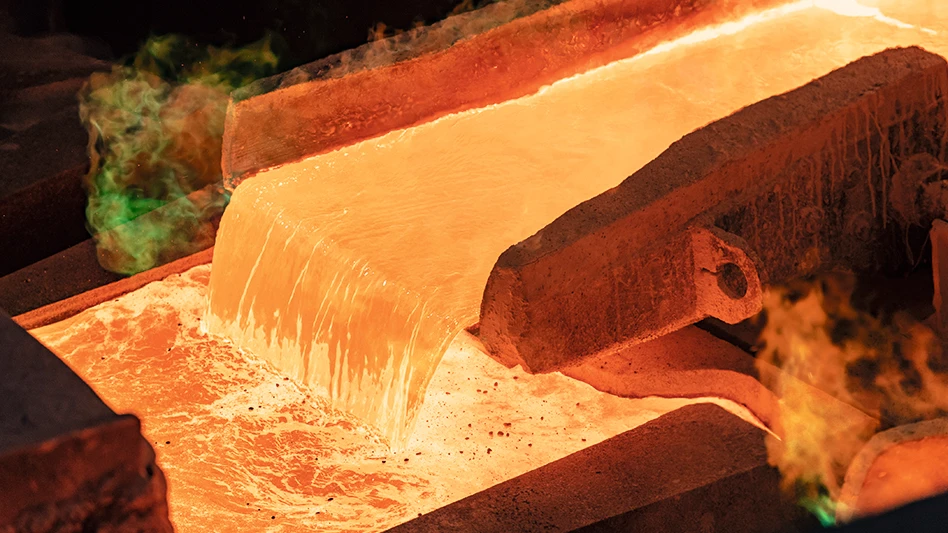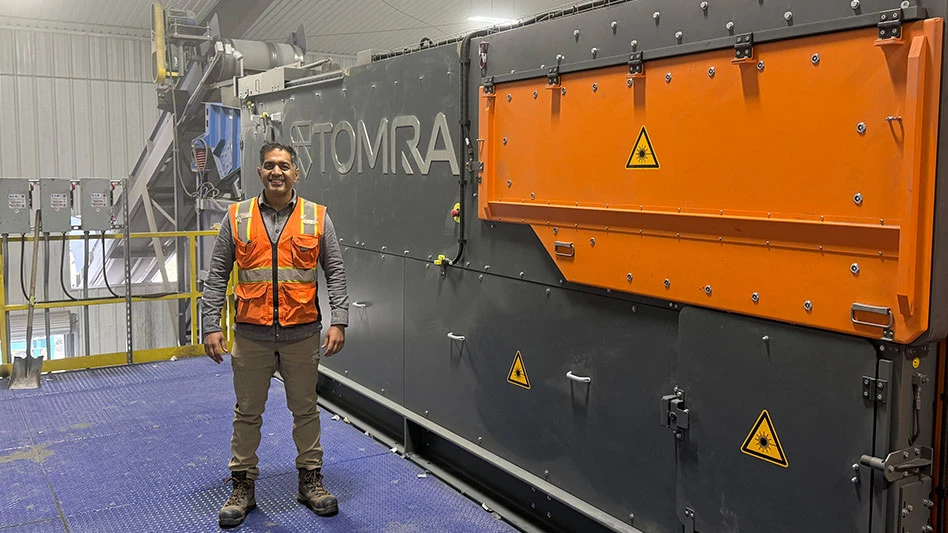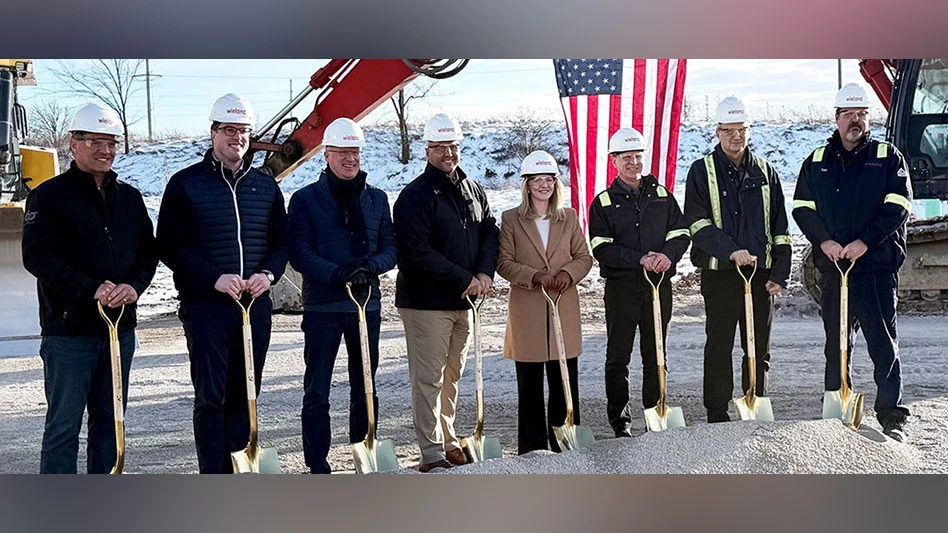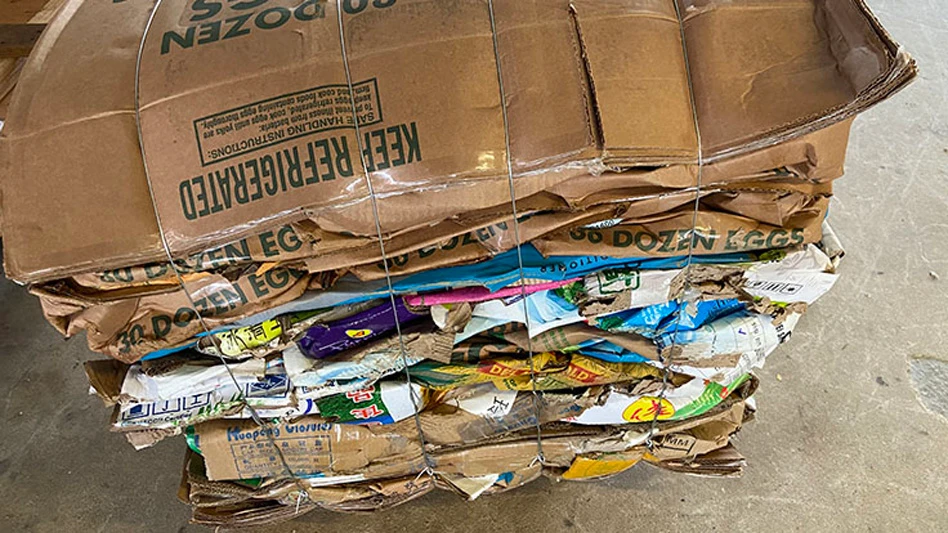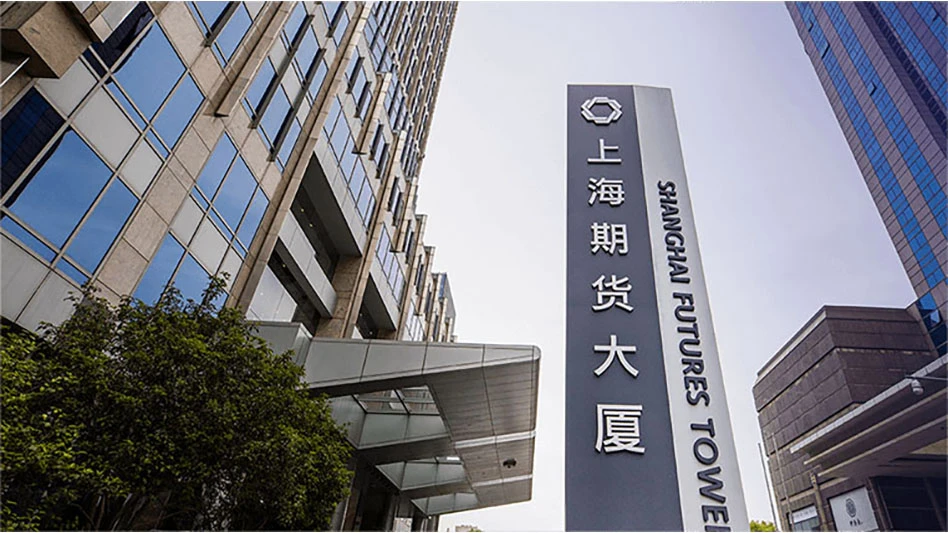
The foundry industry in the U.S. isn’t what most would consider a growth sector. But Wisconsin Aluminum Foundry, or WAF, of Manitowoc, Wisconsin, a vertically integrated nonferrous foundry that consumes recycled aluminum, is bucking that trend.

The company, which has been led by CEO Sachin Shivaram since mid-2019, has grown through acquisitions in addition to expanding its Manitowoc operations.
When he joined WAF, Shivaram was struck by the company’s potential, given its reputation, excellent products and the strength of its balance sheet.
“It was clear that we could really grow on this foundation and really take our business model that had been quite successful and expand it to other foundries and grow our business,” he says.
WAF began acquiring other companies and investing in its own capabilities.
Investing in growth
“One of our first moves was to acquire a machine shop that was focused on pattern making,” Shivaram says of WAF’s purchase of Manitowoc Pattern & Machine (MP&M), which was founded in 1960. “But then we converted it into production machining, and we built a brand new building and then started growing that division.”
While WAF purchased MP&M before Shivaram joined the company, the acquisition added new, advanced technologies, evolving WAF’s capabilities and developing specializations in production and prototype machining with CNC machining centers, coordinate measuring machines and custom nondestructive testing, he says.
MP&M is not only a machine shop partner for WAF, which does 60 percent of its machining there, it also serves external customers.
“Sixty percent is ferrous castings,” Shivaram explains. “We don’t make any ferrous castings; we source them from all the good partners that we have—Grede Industries, Blackhawk, Waupaca, MTI [and] Rochester Metals—and also we machine our own castings.”
WAF went on to purchase its first foundry, Wabash Castings in Wabash, Indiana, in 2021. Shivaram describes it as “a foundry with an incredible history that had fallen on very hard times.”
Wabash ended up being owned by a private equity firm that had lent the foundry money.
“They didn’t really want it, and they lost money for six straight years— 72 straight months of losses, not a single month of profit,” Shivaram says. “But we saw promise in the technology, and it fit with what we were doing. We could make [castings] in low volumes, or we could make high volume, but we couldn’t make complex,” he says of WAF’s abilities prior to the Wabash Castings purchase, “and so this fit that one niche that we didn’t have.”
Buying Wabash also helped to accelerate WAF’s growth in the electric vehicle and consumer goods markets.
Shivaram says WAF raised wages for the staff at Wabash Castings on Day 1 by 15 percent in addition to expanding 401(k) benefits and providing additional employee benefits.
“We communicated to all the employees, either we’re going to make this place super successful, or we’re going to fail but not because of wages,” he says. “I mean, that’s a drop in the bucket. We wanted to get all the team motivated.”
Shivaram notes employment has doubled at Wabash Castings since WAF purchased the company, and profitability has returned.

WAF also has invested in the company, adding a new, $1.5 million Joest Complete Shaker System to improve operations and reduce landfill waste. The shaker system allows the aluminum casting manufacturer to reclaim more of the sand used in its manufacturing process. Approximately 500 tons of sand are reclaimed and reused monthly, reducing the amount of new sand needed by approximately 50 percent.
In early 2022, WAF acquired Dee Inc. in Crookston, Minnesota, which Shivaram describes as “a replica of what we have in Manitowoc—similar molding lines, permanent mold and sand, also fully integrated with machining.”
Dee’s former owners remained with the company, which now goes by Dee Manufacturing. Shivaram says the purchase allowed WAF to pour “oddball alloys,” while its Manitowoc and Wabash facilities focus on A319 and A356 alloys.
WAF purchased low-pressure casting company Atek Metal Technologies, New Hampton, Iowa, in the first half of 2024. Shivaram says the company worked on the acquisition for a year. “The founder [Fred Bieber], who was a real visionary in the foundry industry, had passed away, and his daughter had other interests, but she wanted to see this company continue to prosper,” he says.
“In the foundry industry, when people sell their foundries, it’s generally because things are going bad, and this one was not one that was going bad.”
However, Atek’s business was highly concentrated on a single customer.
“It was a good, money-generating place but had this huge risk. So [financial buyers] had difficulty completing the acquisition,” Shivaram says. “We were able to come in as kind of a Plan B for the sellers, and it makes a wonderful fit for us. We know the technology because we have similar stuff at our foundry, and we bring a national sales presence.”
He says under WAF’s ownership, Atek is working to add new customers.
“I think by the end of this year, our customer concentration is going to be down from 95 percent for that one customer to 67 percent … which is about a year and a half since our acquisition.”
The company’s most recent acquisition was Anderson Global, an aluminum foundry tooling manufacturer based in Muskegon, Michigan, that was founded more than 40 years ago by John and Betsy McIntyre.
Anderson Global, a longtime WAF partner, employs more than 50 journeymen machinists and has a deep bench of engineering talent and advanced machining assets to produce complex and high-precision tooling.
“They make the best aluminum foundry tooling out there, specifically for permanent mold, which is where we’ve been growing,” Shivaram says.
“We knew the owners, and they approached us; they didn’t talk to anybody else about selling their company. They really wanted to see if it would be a good fit for us, which it was.”
The 50 journeyman patternmakers WAF acquired through the Anderson Global purchase represent an “enormous abundance of riches in terms of talent,” Shivaram says. “For instance, outside of Anderson Global, we only have two journeyman patternmakers.”
Anderson Global employs 80 people overall, with WAF retaining everyone and adding a new vice president/general manager, Matt Brauer, who joined the company from Great Lakes Castings.
Along with these acquisitions, WAF has invested in its Manitowoc foundries.
“We just completed our largest expansion ever,” Shivaram says of the $25 million project that involved adding a 55,000-square-foot foundry in Manitowoc. “It’s a brand new foundry, all focused on permanent mold, so tilt-pour and low-pressure. We also bought a 3D sand printer, so we can print our own cores. We bought a 3D metal printer, so we’re doing a lot of internal parts there.”
Additionally, WAF remodeled its offices in Manitowoc. That city also is home to its consumer cookware division, All American 1930, which manufactures pressure cookers, Dutch ovens and more.
WAF and its divisions now have seven locations throughout the Midwest and employ 1,000 people.
“So, that’s our journey,” Shivaram says of WAF, which was founded as a scrap metal recycling company in 1909 by Abe Schwartz, an emigrant from Belorussia, known as Belarus today. The company remains family-owned, and Shivaram is only the second person outside the Schwartz family to lead WAF.
“We’re building a champion in our industry,” Shivaram says. “We’re always on the lookout for acquisitions, especially if they’re closely aligned companies in our industry that have a capability that we don’t have. So, acquisitions will certainly be a part of our path. For now, we’re focused on putting all this great stuff that we have to work for our customers.”

Integration & information sharing
Shivaram says WAF is working to create engineering synergies among its newly acquired companies and to expand its culture, which he describes as intimate and family-oriented.
“I feel like I know everybody, and it’s not just their names, … we all know each other’s stories,” he says.
Shivaram says he meets with new hires every Monday to learn more about their backgrounds, families and aspirations, so that the next time he sees them on the shop floor, he says they have “something to build on.”
Each plant also has an employee-only Facebook page where employees can connect.
“Sometimes, [there are] critical comments about the company. I, for instance, have been called ignorant on that page,” Shivaram says, recalling an employee who complained about a ventilation issue in the plant.
“Indeed, I was ignorant,” he says, which led Shivaram to visit the plant and ask the employee to show him the issue, which the company then addressed.
“What we have not tapped into enough is how do we learn from each other. This is a very unique thing about our company,” Shivaram says. “There are very few foundries in our industry that have multiple locations.”
Its acquisitions give WAF the opportunity to see how other companies address common issues. One way it is doing that is through a weekly problem-solving call with its engineers where one of its locations presents a problem it’s working on to the group to brainstorm solutions.
“We’re also trying to make engineering work fungible across foundries,” Shivaram says, with the goal being commercial harmonization.
“We do go to market from all the foundries together, and that’s been an important synergy.”

Meeting growing aluminum demand
With its recent growth, WAF is well-positioned to take advantage of the aluminum industry’s expansion.
“In the aluminum industry, there’s so much growth and excitement, and it’s a little different than the iron casting industry, where the story is about shrinking capacity to meet their sinking demand,” Shivaram says.
“We feel that if we’re successful in this, no matter what happens in the economy, there’ll always be a place for us. Sure enough, customer response has been tremendous,” he says, adding that WAF’s sales have grown by 300 percent over the last few years.
The parts WAF makes are used in the aerospace, agriculture, automotive, construction, defense, heavy truck, marine, medical, oil and gas and rail industries.
WAF primarily produces aluminum castings using recycled materials as well as some brass castings. Its Wabash facility consumes clean production scrap and wheels that are free of paint and residues. None of the facilities has a baghouse, so Shivaram says WAF is limited on the types of scrap it can purchase, noting the company generally buys recycled ingot.
WAF purchases scrap directly from MetalX, headquartered in Fort Wayne, Indiana, and companies that “bake off” residuals from wheels. The company also buys scrap and secondary alloys through brokers and distributors that include Beck Aluminum International LLC in Chagrin Falls, Ohio, and Z-Alloy Inc., Crown Point, Indiana.
Shivaram says WAF used to buy prime aluminum ingots until the Trump administration enacted the Section 232 tariffs on aluminum imports in 2018. Switching to recycled ingots saved WAF money, he says, and enabled the company to buy from local suppliers, mostly in Indiana and Minnesota.
WAF also purchases sow and uses revert scrap from its own facilities. The company buys 50 million pounds of aluminum per year and sells roughly 5 million tons of scrap to the external market.
“I tell people that we are the poster child for the type of company that is perhaps the intended beneficiary of the tariff policy,” Shivaram says. “The tariffs on steel and aluminum include aluminum castings. … That should be a big help to us. We do compete against foundries from Canada and Mexico, principally, but from all over the world—Europe, of course, China, Korea [and] India— so this should give us something of an advantage.”
However, the chaos around the administration’s tariff policy has reduced demand for castings, Shivaram says, adding that once consumers feel more certain about the economy, demand will grow as it was prior to March when the tariffs were enacted.
“There’s a lot of strength that seems to be now on pause, and maybe it becomes pent-up, maybe we have a good surge once we’re all clear with this thing,” he says. “We make engine parts for backup power systems for data centers, for instance. That has been just exploding in growth, so I think a lot of that’ll come back once there’s certainty.”
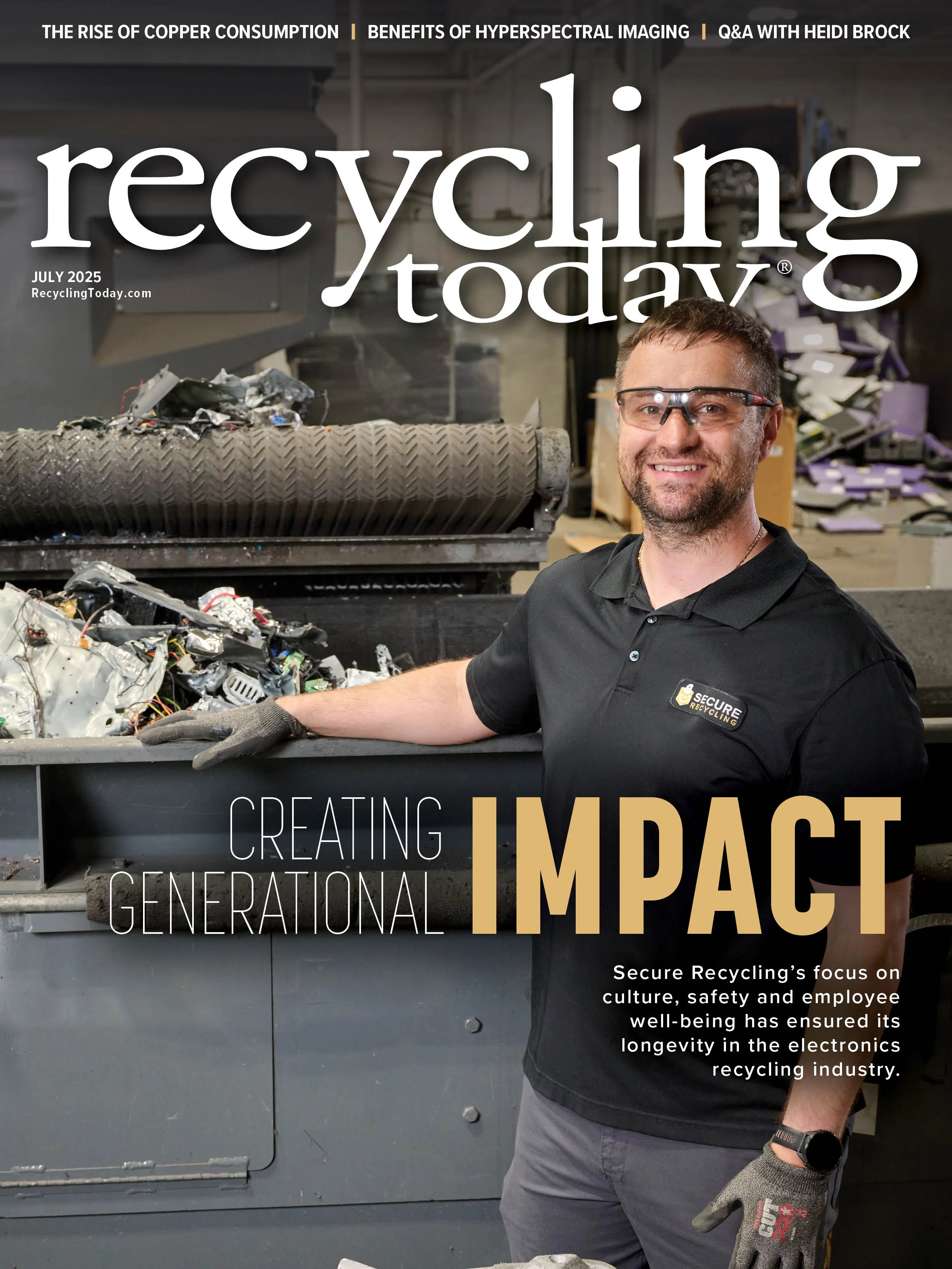
Explore the July 2025 Issue
Check out more from this issue and find your next story to read.
Latest from Recycling Today
- Aduro selects Netherlands as site for industrial scale-up facility
- Nasco-Op declares dividend
- Cyclic Materials announces plans for South Carolina campus
- WM reports revenue, earnings growth in Q4 and full-year 2025
- Solarcycle’s Cedartown, Georgia, recycling facility opens
- Stadler equips Spanish MRF
- SSAB finishes 2025 with decreased revenue
- Vecoplan appoints CFO
